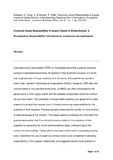- CERES Home
- →
- School of Management (SoM)
- →
- Staff publications (SoM)
- →
- View Item
JavaScript is disabled for your browser. Some features of this site may not work without it.
| dc.contributor.author | Amaeshi, Kenneth | |
| dc.contributor.author | Osuji, Onyeka Kingsley | |
| dc.contributor.author | Nnodim, Paul | |
| dc.date.accessioned | 2009-03-30T13:51:03Z | |
| dc.date.available | 2009-03-30T13:51:03Z | |
| dc.date.issued | 2009-03-30T13:51:03Z | |
| dc.identifier.citation | Amaeshi, K., Osuji, O. & Nnodim, P. 2008, 'Corporate Social Responsibility in Supply Chains of Global Brands: A Boundaryless Responsibility? Clarifications, Exceptions and Implications', Journal of Business Ethics, vol. 81, no. 1, pp. 223-234. | |
| dc.identifier.issn | 0167-4544 | |
| dc.identifier.uri | http://hdl.handle.net/1826/3312 | |
| dc.identifier.uri | http://dx.doi.org/10.1007/s10551-007-9490-5 | |
| dc.description.abstract | Corporate social responsibility (CSR) is increasingly becoming a popular business concept in developed economies. As typical of other business concepts, it is on its way to globalization through practices and structures of the globalized capitalist world order, typified in Multinational Corporations (MNCs). However, CSR often sits uncomfortably in this capitalist world order, as MNCs are often challenged by the global reach of their supply chains and the possible irresponsible practices inherent along these chains. The possibility of irresponsible practices puts global firms under pressure to protect their brands even if it means assuming responsibilities for the practices of their suppliers. Pressure groups understand this burden on firms and try to take advantage of the situation. This paper seeks to challenge the often taken-for-granted-assumption that firms should be accountable for the practices of their suppliers by espousing the moral (and sometimes legal) underpinnings of the concept of responsibility. Except where corporate control and or corporate grouping exist, it identifies the use of power as a critical factor to be considered in allocating responsibility in firm-supplier relationship; and suggests that the more powerful in this relationship has a responsibility to exert some moral influence on the weaker party. The paper highlights the use of code of conducts, corporate culture, anti-pressure group campaigns, personnel training and value reorientation as possible sources of wielding positive moral influence along supply chains. | en_UK |
| dc.language.iso | en | en_UK |
| dc.subject | responsibility | en_UK |
| dc.subject | firm-supplier relationship | en_UK |
| dc.subject | purchasing ethics | en_UK |
| dc.subject | responsible supply chain management | en_UK |
| dc.subject | corporate control | en_UK |
| dc.subject | corporate group | en_UK |
| dc.title | Corporate Social Responsibility in Supply Chains of Global Brands: A Boundaryless Responsibility? Clarifications, exceptions and implications | en_UK |
| dc.type | Postprint | en_UK |
| dc.type | Recording, oral | en_UK |
Files in this item
This item appears in the following Collection(s)
-
Staff publications (SoM) [1258]

